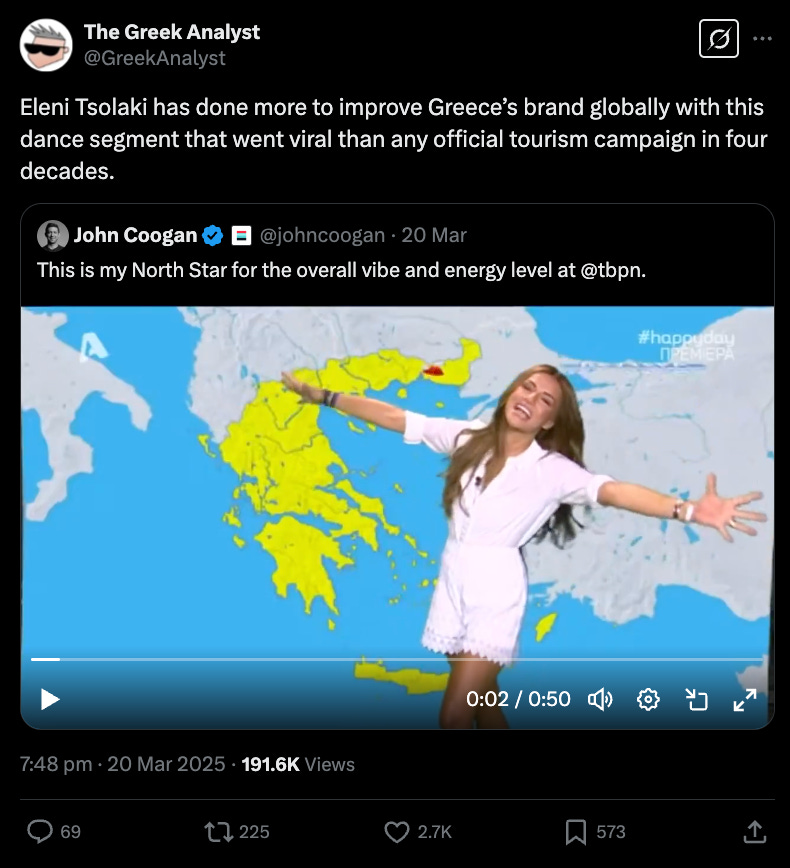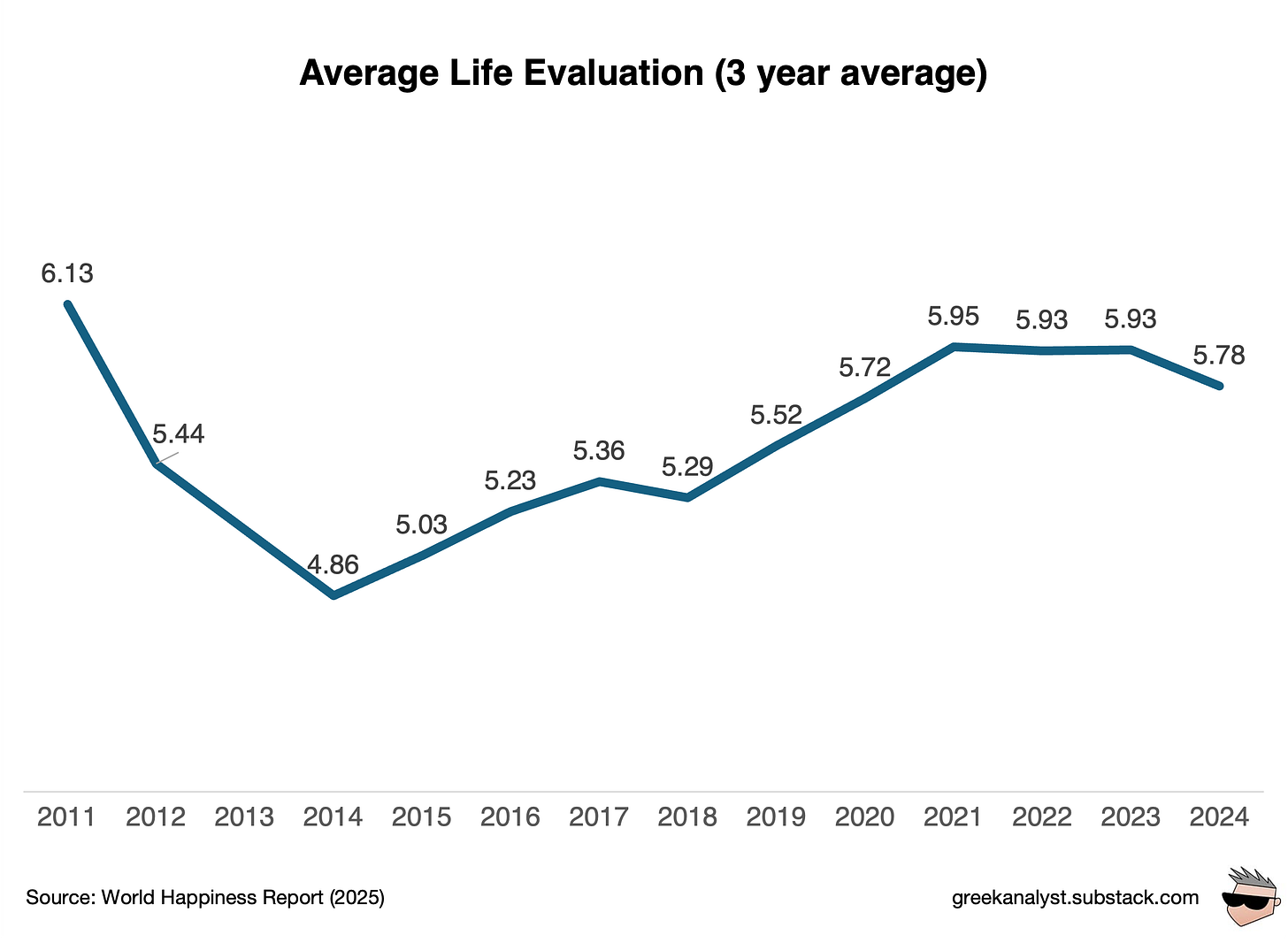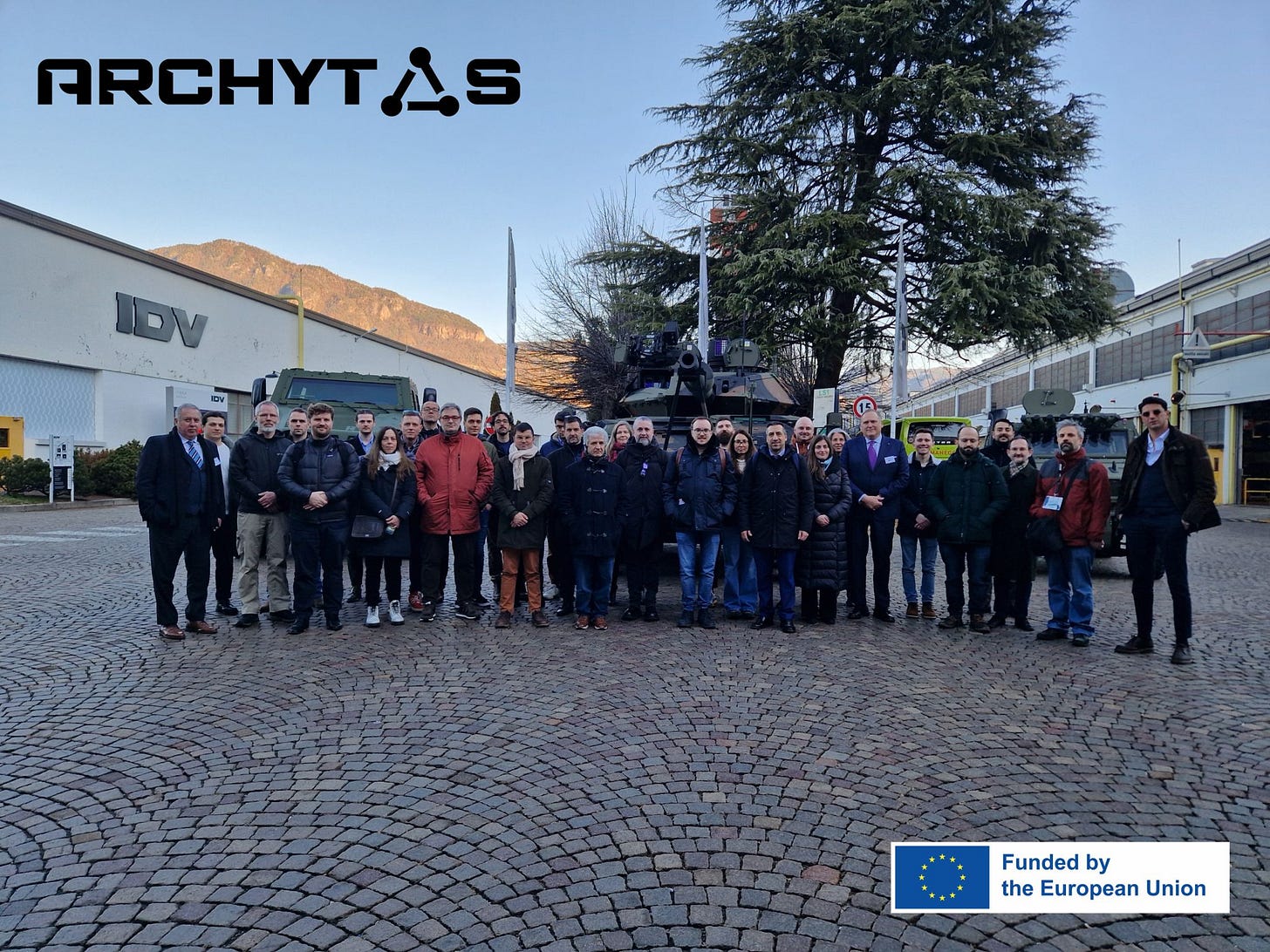How happy are the Greeks?
A highly philosophical question with very measurable results
Welcome to the 48 awesome new readers who joined us in the past week!
If you haven’t subscribed, join 3,448 smart, curious people interested in Changing Greece.
😁 How happy are the Greeks?
Last week, I made a post on X that went semi-viral.

If you have not seen it yet, this is an old video of Eleni Tsolaki that has been breaking the internet in recent months, after unexpectedly becoming a sensation with people outside of Greece. (If you have not seen it yet, I highly suggest you do.)
I love this video. It radiates an unashamed positive energy and absolute happiness. I know that others might disagree or find the context weird (a talk-show host “sharing weather forecasts” while dancing on a hype song during a light afternoon gossip show), but let’s put those concerns aside for the moment.
The video serves another purpose. It opens up one of the most important questions we can ask about life in Greece today: how happy are really the Greeks?
I had to find out.
Like any half-decent Greek, I thought of starting a philosophical debate about the concept of a happy life. But that would take millennia to produce results.
So what’s the next best thing?
You’ve guessed it right: charts and numbers!
Let’s jump in.
Happiness tied to economic well-being
Why is happiness important?
There are many social, cultural, psychological, biological reasons.
The most interesting for me? An economic one.
There is a very strong correlation between happier nations and economic activity.

The relationship between happiness and economic wellbeing is a very important one, and there is even an entire discipline dedicated to it. It’s called happiness economics.
While causality is not always easy to establish, it looks like people in richer countries tend to be happier, and within all countries, richer people tend to be happier.

That is not altogether surprising.
It’s also not surprising to think that there is level after which more money (or income, spending power, growth, status) stop being as effective drivers of more happiness. In a recent study in the US, that number was found to be around $100,000.

As you might probably remember from your introductory economics courses, this draws from the law of diminishing returns.
Sadly, I don’t think most people in Greece share this problem. In fact, the country only recently escaped from a devastating depression that lasted more than a decade.
This depression was both a metaphorical one (the deepest economic crisis on record) but also a very literal one (a national collective trauma).
Going into this exercise, I started with the assumption that this must have had a strong effect on the levels of observed happiness in the country during the 2010s.
Let’s see if that’s the case.
Share of Greeks who are happy (Integrated Value Survey)
According to the seminal Integrated Value Survey (IVS), Greeks have consistently expressed being less happy than their European peers since the early 2000s.
We can compare Greece to Ireland, Spain, Portugal and Italy — the four other countries that suffered most at the beginning of the financial crisis (and all branded together with the terrible derogatory term “PIIGS” at the time).

Greece has been a negative outlier both before, during and after the crisis.
That’s not a great sign, but it’s definitely a very interesting finding.
Overall life satisfaction in Greece (Eurostat)
Eurostat’s quality of life indicators provide another good proxy for happiness with the “overall life satisfaction” indicator (0 to 10).
As Greece moved away from the crisis, overall life satisfaction in Greece improved from 6.2 in 2013 to 6.9 in 2023, its highest rating in more than a decade.
While trailing the EU average, it has closed the gap by half (from 0.8 to 0.4 points) over the same period.

Despite this very positive trend, Greece remains in the bottom 3 countries of the EU in terms of overall life satisfaction, tied with Latvia (6.9) and right above Bulgaria (5.9).
Average life evaluation of Greeks (World Happiness Report)
According to the World Happiness Report, Greece’s average life evaluation (0 to 10) has changed drastically over the past 15 years.
From a top of 6.13 in 2011, Greece faced a bottom of 4.86 in 2014. It then gradually started to move upwards going as high as 5.95 in 2021, falling slightly thereafter to 5.78 in 2024.
Greece’s global happiness ranking has followed a very similar roller-coaster.
Greece’s top 3 best annual rankings:
2011: 42th
2020: 58th
2021 58th
Greece’s bottom 3 worst annual rankings:
2014: 102th
2015: 99th
2016: 87th
While we are far from the bottom today, the trend has started moving negatively again with Greece scoring its worst rating in 2024 since 2018.
Trend of Greek happiness (World Database of Happiness)
According to the World Database of Happiness, Greece scored an average happiness level of 6 out of 10 between 2010-2019, ranking 95th out of 160 countries.

Based on this database, Greece’s three worst years were 2012, 2013 and 2016. Its three top peaks looked like 1989, 2006 and 2022. I would not draw any fast conclusions from this, but it sure seems very interesting.
You can also see the big drop after 2008, which coincides with the beginning of the crisis and lasted for almost a decade. I call that the “valley of unhappiness”.
The meaning of life for the Greeks (Pew Research)
Quantitative metrics can tell us how happy Greeks are. We need qualitative ones to tell us what makes people in Greece happy.
According to Pew Research, the most important thing that gives Greeks a meaning in life is family. This is also the first choice for most other developed countries.

For older Greeks, family and children are very important.

For younger Greeks, it’s friends and community that are most important.

In both cases, we see human connection as being at the top of mind of most Greeks, irrespective of age. I find this fascinating and also quite hopeful in an age when the rise of artificial intelligence is pushing us away from our core humanity.
What if Greeks were more like a football team?
A few days ago, the Greek national football team played against Scotland.
Greece won by a landslide (0 - 3). It had been a long time since I felt that happy. Not because of the win itself. But because of how well the team played. Because of how passionately I celebrated together with friends. Because of how connected I felt with the rest of the country. Because of how proud I was to see a young squad being trusted to deliver, and them going above and beyond. Because of how hopeful I was about the future of this new generation of Greek footballers. And because football is life.
These were all very positive feelings: pride, certainty, confidence, hopefulness.
And yet, if you asked a random Greek person in the street today (or at any time during the past 15-20 years), I’m sure you would rarely hear them give any of these answers as their first response. Or second. Or even third.
Don’t take my word for it. Dianeosis has actually tested this in the 2024 edition of their amazing “What do Greeks believe in” report.

In the Dianeosis survey, only 13.7% of Greeks responded with “hope” as their first answer when asked about the strongest feeling they share as a Greek person. 5.8% said pride. 4.6% said certainty. And 3.1% said confidence.
I find this devastating. But also illuminating.
We all have our own problems to deal with. I’m sure you have more on your plate today than you wished for. And that’s natural. Life is not always easy. But it does not always have to be hard either.
Unfortunately, Greece is often too hard and for too long for too many people. With few remarkable historical exceptions, Greeks prefer to fight against each other or trip each other when one is doing something well. Today, a sense of injustice and high polarization permeate society. The worst are awarded while the best feel (or become) punished. The most entrenched vested interests grow bulimically with nobody in sight to stop them. The loudest populist voices make the most noise and command the most air time.
What if Greeks could come together as one team and rally towards the same goal more often? What if we could enable more of the new generation to deliver spectacular results rather than punish them with low salaries, few opportunities and glass ceilings? What if we could combine the forces of both amazing Greeks from within and awesome Greeks from abroad? What if we could trust the most competent and respected people to lead us?
What if Greeks could be more like the Greek national football team last Sunday?
I think Greece would then be a much happier (and wealthier) place.
🏭 Economy & Business
Greece has one of the best global manufacturing PMI numbers (top 6) but still one of the highest headline inflation rates (3%) across the developed world
Greece had one of the top increases across EU in manufacturing output volume AND real gross value added (GVA) in manufacturing since 2019
Industry’s Gross Value Added (GVA) had the largest contribution to Greece’s GDP growth in 2024 (exceeding that of services sector) for first time since 2017
Metlen’s gallium production facility in Greece selected as one of EU’s strategic projects for critical raw materials
Theon Sensors and its founder (now a billionaire) spotlighted in Bloomberg
Chevron’s exploration of hydrocarbons south of Crete accepted by GR govt
Greek merchant fleet up 1.0% y-o-y in Jan 2025, but gross tonnage down 2.3%
Household debt as % of disposable income at one of lowest levels in OECD
Unicredit predicts 2.3% GDP growth for Greece in 2025
Turnover index in industry up 2.2% y-o-y in Jan 2025
🤖 Tech & Startups
ARCHYTAS, an EDF Research project, will investigate dedicated hardware architectures for energy-efficient AI over the next 3 years
Hewlett Packard Enterprise selected to build Greek supercomputer DAIDALUS that aims to reach 89 PetaFlops of power
HCDI released an open solicitation for developing a cargo-carrying UAV
Brainomix (AI imaging) has raised a $18M Series C round
ORamaVR (medical XR) has raised a fresh round of funding from Evercurious
How Greece is evolving as an emerging innovation hub for deep-tech startups
Dimitris Glezos wrote about the distorted reality of startup success stories
Alkistis Kyriakopoulou talks about the revolution of data in maritime
Llama-Krikri, the new Greek language LLM, gets a profile
🙌 Celebrating Greek wins
Konstantinos Karetsas has made history by becoming Greece's youngest goal scorer of its national football team and youngest scorer in the Nations League history
Greek students from NTUA and UoA top the charts of SEEMOUS 2025, the 19th South Eastern European Mathematical Olympiad for University Students
Syros is attracting expats, remote workers from other Greek cities and digital nomads from all over the world
Stathis Soulios, a blind coach of a blind judo athlete, shares his experience
📣 Greeks hiring: Coolest jobs out there
Head of Business Development @ Pod Network, Remote
Investment Professional @ Kos Biotechnology Partners, Greece
Analytical Consultant, Large Customer Sales @ Google, Greece
Senior Front-end Engineer @ Hack The Box, Greece
Various engineering roles @ Natech (Snappi neobank), Greece
Foundational AI Research Engineer @ Piramidal, UK
Robotics Researcher @ Alten, Belgium
Msc Intern in Electricity Markets Algo Trading @ Hitatchi, Germany
Assistant Professor in Classics (Greek & Latin) @ U of Cambridge, UK
If you have a cool role (in tech, finance, academia) that you would like to be highlighted, please message me. I will be picking and sharing the coolest ones I find every few weeks.
That’s it for today! If you enjoyed today’s newsletter, please let me know with a like or reply. And if you value my content each week, consider pledging your support. Thanks!













Indeed, your point about collective efforts that have concrete and specific long-term goals lead to greater success. Can't we correlate this fact with the statistics coming from Taiwan? Society being the 1st source of happiness for its citizens.
I wasn't aware of the research by Dianeosis, but you might want to have a look (if you haven't already) at the research by the youth organisation InfinityGreece in partnership with Ierax Analytix on the needs of young people, who also put a strong emphasis on the lack of hope.
https://infinitygreece.com/single-projects/%CE%B1%CF%85%CF%84%CE%BF-%CF%80%CE%BF%CF%85-%CE%B8%CE%B5%CE%BB%CE%BF%CF%85%CE%BD-%CE%BF%CE%B9-%CE%BD%CE%B5%CE%BF%CE%B9
Good read. The numbers for the U.S. are changing rapidly, and not in a good way.